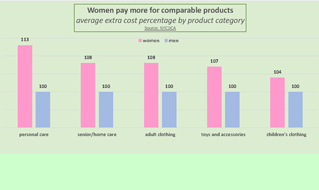Fitbit Must Face Lawsuit Over Sleep-Tracking Claims
by Chris Morran, Consumerist

Fitbit also contended that the marketing claims are just “puffery,” meaning general statements of superiority that can’t be taken as false advertising. Yet the judge found this argument unconvincing. Read More ›
‘Pink Tax Repeal’ Bill To End Gender-Based Pricing: U.S. Rep. Jackie Speier Calls For Practice To End, Announces Legislation
by Sara Gaiser Bay, San Mateo Daily Journal

Speier, a former state senator, previously introduced California legislation that passed in 1996 that required pricing for services like dry cleaning and haircuts to be based on the amount of time it took to do the job, not gender. Read More ›
Health Gadgets And Apps Outpace Privacy Protections, Report Finds
by Charles Ornstein, ProPublica

The Health Insurance Portability and Accountability Act, the landmark 1996 patient-privacy law, only covers patient information kept by health providers, insurers and data clearinghouses, as well as their business partners. Falling outside the law’s purview: wearables like Fitbit that measure steps and sleep, at-home paternity tests, social media sites, and online repositories where individuals can store their health records. Read More ›
Former Corinthian College Students Sue To Have Private Loans Discharged
by Ashlee Kieler, Consumerist

The lawsuit, filed in Los Angeles, against Turnstile Capital Management, LLC, Balboa Student Loan Trust, and University Accounting Service, LLC seeks to provide California students defrauded by the for-profit college chain with full debt relief. Read More ›
Perilous Quarters: Deaths, Serious Injuries Highlight Longstanding Concerns Over Staffing Ratios In Assisted-Living communities
by Paul Sisson, San Diego Union-Tribune

In California, assisted-living facilities and memory-care centers are not technically medical establishments. They are not required to employ medically trained experts. Read More ›
Election 2016: Big Pharma’s $70 Million Tops California Campaign Contributions
by Tracy Seipel, San Jose Mercury News

The money is piling up on behalf of campaigns for 17 statewide ballot measures — the most since March 2000. And when it comes to big backers, Big Pharma is far and away the towering force. Read More ›
Pink Tax Repeal Act Aims To Make Pricing Fair To Women
by Carla Fried, Consumer Reports

Last Friday, Congresswoman Jackie Speier (D-CA) aimed to put an end to pricing products according to gender. She introduced the Pink Tax Repeal Act—a bill that would prohibit companies from charging different prices for similar products or services simply based on the gender of the customer. …
“As a rule, the man’s version or a neutrally-branded product is going to be less costly than the womens or girls version,” says Richard Holober, executive director of the Consumer Federation of California. “Consider buying products that aren’t specifically labeled for the use of women.” Read More ›
Engineer Calls Years Of PG&E Safety Cuts ‘Near Criminal’
by Bob Egelko, San Francisco Chronicle

The crux of the prosecution is that PG&E, contrary to its stated policy, consistently sacrificed safety for profits. Read More ›
Edison Calls Settlement That Left Consumers On Hook For $3.3 Billion Reasonable
by Ivan Penn, Los Angeles Times

Consumer advocates filed their own arguments Thursday in favor of reconsidering the settlement. They argue that Edison should be held responsible for the premature closure of San Onofre in June 2013 after faulty replacement steam generators were installed at the plant. Read More ›
Federal Investigators Probe Google Over Age-Discrimination Complaints
by Ethan Baron, San Jose Mercury News

The lawsuit and investigation are taking place against a tech industry backdrop in which older workers are shuffled out to make way for younger — and cheaper — employees, said UC Davis computer science professor Norman Matloff, who studies age discrimination in the sector. Read More ›
Details Emerge In Whistleblower Suit Against Ontario-Based Prime Healthcare
by Neil Nisperos, Inland Valley Daily Bulletin

The U.S. Department of Justice in June announced it was intervening in an employee’s whistleblower lawsuit against the company, which owns and operates 14 hospitals throughout the state, including facilities in San Dimas, Garden Grove, Anaheim, Inglewood and Encino. Read More ›
Bill Calling For Price Equity For Items Marketed To Females Fails
by Bob Egelko, San Francisco Chronicle

Richard Holober, executive director of the Consumer Federation of California … said his organization would try again next year. Women already earn less than men in wages for similar work, he said, “and then when they spend their hard-earned dollars, they’re charged more.” Read More ›
Gender Pricing Discrimination – Democrats Team With Republicans To Stop SB 899 (Hueso)
SACRAMENTO – Consumer Federation of California-sponsored SB 899 (Hueso), a bill that would have ended gender pricing discrimination, was stopped by Democrats and Republicans in today’s meeting of the Assembly Judiciary Committee. Read More ›